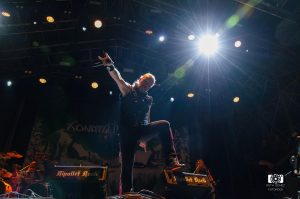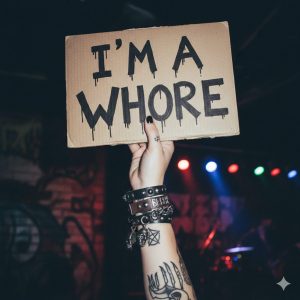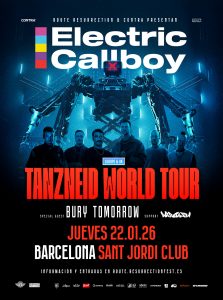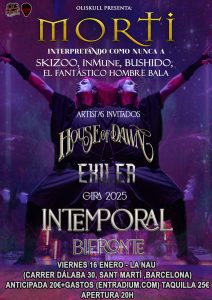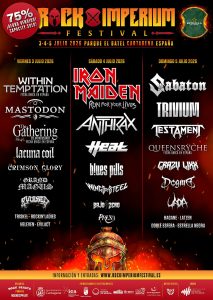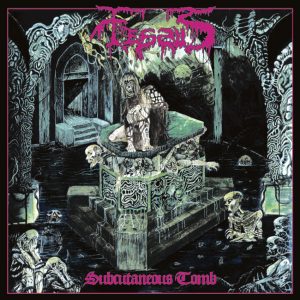VIPERWITCH: Forging Shadows: A Symphony of Defiance and Magic

In this riveting conversation, we dive into the heart of Witch Hunt: Road to Vengeance, a genre-defying album that blends the raw ferocity of heavy metal with vivid, cinematic soundscapes. From tackling societal frustrations and embracing the divine feminine to creating immersive, dark fantasy worlds inspired by literature and film, this interview with Viperwitch reveals a journey fueled by defiance, resilience, and unrelenting creativity. Join us as we explore how ritual, rebellion, and storytelling come together in a hauntingly powerful artistic vision.
Hi, first off, thanks for answering our questions. How’s everything in the lair of Viperwitch a few days after releasing your newest album?
I’m incredibly honored to be here. Thank you so very much for your time. Honestly, it was a vortex of chaos, but that’s how DIY goes! However, it’s January now, and we’ve leveled out quite a lot, lol.
“Witch Hunt: Road to Vengeance” fuses heavy metal with vivid, cinematic soundscapes and diverse genres. Can you walk us through how these unconventional layers—like synths, spoken-word sections, and haunting soundscapes—contribute to the story you’re telling with this album? How do they add to or contrast with the album’s raw metal essence?
I knew it was going to be a gamble going this route. With traditional heavy metal, there are rules to follow, and typically those rules include sticking with raw heavy metal and nothing else. However, when I was designing and creating these worlds and these characters long ago, I felt that the music alone wasn’t going to support my intention of fully immersing people into the story in this world. The entire point of it was to drag people out of their stressful lives in a somewhat bleak society and put them directly into this place of fantasy and adventure.
As somebody who grew up looking up to a lot of movie composers, I felt that to fully immerse people, I needed to go the route of the old-school rock operas we grew up on. Building a concept album is exactly that—it’s more than just the raw heavy metal. You have to bring in other elements, be creative, and be ambitious with it, no matter how much people might hate it. And for those that hate it, it’s not for them; they just don’t get it, and I was okay with that.
Synthwave is a genre I deeply love and connect with, and I feel since it’s rooted in the ’80s, it wouldn’t be too difficult to blend the two to some degree. It was a way for me to connect heavy metal and movie ambience—a bridge of the two opposite worlds that brings feelings of excitement and adventure. The entire point of music is to invoke emotion, and I felt that these elements blended enough together to help people get and stay there.
Although some people have seen this as a massive contrast—too ambitious, half-baked, lacking in character, lacking flair, pointless, annoying, or too much, completely going against traditional heavy metal rules—I have also seen, on the other end of the spectrum, people who absolutely love it and get it. It works for them and brings them exactly where I intended them to be. But this album is only for open minds and not for those with a miserable, stuck-in-the-shallow-end, lazy disposition.
In tracks like “She Wolves of the Wasteland,” there’s a palpable rage and defiance. Given the powerful, symbolic imagery of wolves and wastelands, what personal or societal issues do you want listeners to confront through this track?
The track itself can take you fairly deep. On the surface level, you have a man who’s trapped by an all-female encampment of she-wolves and has to fight his way out. The further you go, you start to see the world that’s built on a greater scope and start to question: Who are the she-wolves? What is their purpose here? What’s their story? Why do they kidnap men off the road? Who is the hero being kidnapped?
As we look deeper into the story and the storybook that came with the album, we find out many of those questions. And I will leave that up to the reader to go find rather than bore you here and take up hours of your time without your consent, lol. But essentially, we’re confronting survival. We’re confronting how low we have to go before we start fighting for ourselves and who we are fighting. Are we fighting amongst ourselves and other people just like us—just trying to survive—or are we focusing our anger on the bigger issue, the ones that control the power?
Our enemies are not the people next to us; it’s the ones above us who placed themselves there and whom we humbly bowed to many, many years ago. You see this again in “No Gods, No Masters.” I also did a pretty big deep dive walking everyone through the story and telling the story in another interview, which is posted on our Linktree if anybody’s interested!
-Your lyrics touch on themes of vengeance, rebellion, and defiance, especially as heard in songs like “No Gods, No Masters.” What are some societal or cultural frustrations that influenced these themes, and do you feel heavy metal is still a platform to challenge authority and defy norms?
As I stated above, yes, that’s the world that I grew up in, and those are the emotions that I’ve carried my entire life. It also seems to be the same themes I will be facing for the rest of my life as a woman in this society. And I know for a fact I am not the only one, and that’s comforting yet sad.
However, I feel that those themes are exactly what the divine feminine is, and people often confuse it and oversaturate it with misogynistic concepts of femininity for their own personal gain. I feel it’s the best way to survive and hopefully change this corrupt and clearly still archaic, young world.
Heavy metal used to be the place where these themes would not only be celebrated but what helped create it. However, like many aspects of art, just like our society, it becomes corrupt and what feels like being overrun by misogynistic and vapid rules and regulations.
My purpose in what I do is to help bring that spirit back, to help us separate and weed out those issues that have kept us down and have corrupted our music for so long. It’s not easy, and I see a lot of women in our genre doing it with phenomenal men by our sides. There’s still a lot of toxicity and a lot of that pop culture norm bleeding in, but it’s a battle worth fighting because we’re fighting for its main purpose and message, which it was born and bred for.
Within our little pocket of the new wave of traditional heavy metal, we don’t see a lot of that toxicity, and we’re very fortunate, so it is very easy for us to do what we do, have people understand what we’re doing, and get the message across. But once you step outside of that, you are no longer in that bubble, and that’s where the battlefield opens up.
You have to have a very strong sense of self while also maintaining humility, you have to know very clearly what your message is, you have to be organic and genuine in what you do, and you have to put 100% into it. You cannot care what the troglodytes think and push on through the hordes.
The album’s atmosphere is intense and immersive, even cinematic at times. Do you find inspiration in film or literature? If so, how do you translate those influences into music that keeps a listener feeling they’re “in” a dark, unfolding storyline?
This entire album is inspired by a lot of cinema and a lot of literature, and you will find so many of those Easter eggs if you’re a fan. It’s genuinely what inspired this to be a concept album rather than just a heavy metal album. The biggest key to do this is to literally pick the right key and stick with it—finding tones, instruments, rhythms that further build the dark world. From there, it’s just imagination. And for me, although I’m a very bubbly and very kind person, that’s because I’ve gone through so many horrors, and I internally think organically very dark. So cinema and literature that is dark is something I just have always gravitated towards. Therefore, the characters and the worlds I build tend to be very dark. Art is the expression of someone’s soul, and my soul path here has been very dark—but for the purpose of light. Like I said, it’s all about writing what’s organic to you, and this was the most organic thing I’ve created in a very long time. It took me a very long time to create. There were many times people would come to me telling me I should make more upbeat music, but that just isn’t the art I know how to create.
You’ve mentioned your journey with creative struggles and encouragement from family before completing this album. What role did those past experiences and self-doubts play in shaping this album, and how does Witch Hunt represent your growth as artists?
Honestly, I took those struggles and the advice I was given and built them into the world, much like Tolkien did. It just seems easy for me to write my real-life experiences into the experiences these characters are having. Almost every single song and every emotion that it’s invoked came from a real place in my life. What’s interesting is that the way the songs are set up is that they are not interludes; they’re actual songs and whole parts. These are emotions bleeding into one and into the next. If you look at it on a timeline, not only does this walk us through the actual story—from its action-packed moments to its more somber, thoughtful moments, and even spooky moments—but as the songs progress through the album, so did I as an artist. It’s why we ended on a classical piece—a somber place of doubting my success and knowing the battle just started, as the battle just really begins for these characters. For us, it’s the same.
With tracks like “Vapor City: Blood & Steel Upon the Silver Tower,” there’s an intriguing mix of futuristic and archaic imagery. What was the intention behind blending these elements, and do they speak to the contrasts you see in today’s society or music scene?
This world is very much built in this time warp—a futurism, wasteland, and archaic places long forgotten or untouched. It’s kind of where we are in society; where there is new growth, there will always be signs of where we once came. I think for our society, we’re so obsessed with staying the same or the “good old days,” that we are caught in the chaos of change, which is inevitable. And because of that fight of not wanting to fully move forward, we’re stuck, and we’re in pain and suffering. You can see that in the metal world: some people are too stuck in the future that they forget about the past, and some are too stuck in the past that they forget about progressing. And with the concept of the Tall Poppy Syndrome, people that want to harmoniously move forward and still honor our past—they’re often cut down first and left to rot. Fortunately, that mindset stopped quite a while ago, and it’s been catching on, but only in some genres. I hope it’s infectious enough to really move some scenes and move us forward.
“The Ritual: Infinite Nocturn Rites” feels like a haunting, almost meditative journey for listeners. What effect were you aiming for with this track, and do you see ritual as a form of empowerment, perhaps similar to the act of making and performing music itself?
That’s exactly what I was going for, therefore I am so incredibly thankful it came across correctly! In the scene, this is the birth of the Viperwitch. In this piece of the tale, we’re witnessing her birth—a vile yet necessary moment for the universe. It is the birth of balance. I come from a pagan background, and I’m a practitioner myself. I find ritual to be a part of every person’s daily lives and especially art, regardless of what belief system you have. We wash our clothes, we clean our floors, we make habits and patterns. We have rituals in our lives—it’s just hidden to many who are not aware. Words are power and magic, sound is magic; all these things that make music magical are based in its smaller elements and are, in itself, creating magic and transmuting energy. It’s why it’s so potent and so important to many lives and so effective as an art form. When we bring together others, we are forming a circle for a cause. We are bringing together our kin we’ve chosen, calling forth our divine energy and talents to transmute energy into emotion—to share a message, a spell, an incantation, a story, whatever it be, so that we can share with others. It’s quite the ritual in itself!
The imagery associated with Viperwitch—from ritualistic symbolism to the presence of ancient and eerie landscapes—is powerful and distinct. Can you share how you see these visuals aligning with your sound and message? How do you hope listeners interpret these scenes?
It’s the shadow self, it’s divine feminine energy, and it’s the balances of each—to dance with both for the greater good. It’s something that has always been and will always be, long past our time as humans. It’s familiar to all of us—some of us comforting, and some of us terrifying. It all depends on how well enough you know the shadow and the shadow within. That alone aligns with our message of self-love and defiance to that which does not serve the greater good. It also aligns with fighting for it at any cost and finding your community because we are strong in numbers. As for our sound, I feel that’s up to the listener to decide. But for us, it’s just what is organic to write and consistent. I spent far too many decades playing what was NOT organic to myself or only halfway there. I wanted to rip those chains off and fully be who I am for once and write what I was. I wanted to sound how I really felt and happened to find other people that share the same vibrance and color in their magic and craft. Fortunately, I found them and many others who walk the shadow’s path comfortably.
The intensity and themes of vengeance in your lyrics, especially in a genre traditionally dominated by male perspectives, is both striking and refreshing. Do you see your music as a way of challenging the status quo in metal, and do you hope it opens the door for more women to speak fiercely about power and agency?
I’m thankful that our music brings worth to the community beyond just being bad or good. I feel that our genre enables women to be who they are and hold strong roles we were always meant to have. Outside of that genre, it can get shitty, to say the least, but I am too wise to fucking care because my message of empowerment and breaking barriers was deeply seeded in me from a young age. It was and will always be my focus in life—to help build a safer and permanent path for other women who wish to be seen for their dimension and talents. The key is self-love, acceptance of yourself, and NOT giving a fuck. It’s very hard not to, but it’s the armor that will protect you. You have to care MORE about your message, your friends, your fans, and the ones that will follow in your footsteps, because it’s for them—not the assholes that created this fucked-up place. It’s not for the ones that ruin everything, fail at everything, and complain and tear others down. The more we allow them to have a voice and give it energy in our own choices and paths, the longer things will fucking suck the way they have. Fortunately, there are many, many others just like me, if not even better, that are paving the way, and we hope to see more!
The “witch” figure in the album title and your band name evokes a powerful, often rebellious feminine symbol. In what ways does the idea of the “witch” represent your own artistic identity, and how do you hope it connects with your audience’s sense of empowerment or resistance?
I am one; it’s who I am. Maybe not the word witch as most know it, but I’ve carried many titles within my spiritual path. In a sense, we as humans are magical beings. We do amazing things, we create, we affect others’ lives and lineages, we transmute and have rituals, we create our own realities. So much of us is innately magic—only so many accept it. Only so many break away from the dogma of the world and work within ourselves in such a way. For myself, the band’s existence on its own is a resistance to the norm we’ve been fed. And with that, I hope people find it empowering no matter the paths they walk. You can be yourself and simply put more energy into it rather than trying to change it or only selling out parts of the skin-deep. You can come out to the world as the wondrous entity you are and be celebrated just as you are. We are born perfect; the universe doesn’t make mistakes.
And before we wrap this interview up: What are now your near-future plans?
We’re looking to play a couple of festivals this coming year, as well as a couple of tours both to the west and east coast, and hopefully get out of the United States for a couple of shows! We are planning some music videos that I’ve been building up for quite some time—we’re fairly excited about that. I don’t like half-assing things, and I like to make sure that I have all of the resources that I need to execute my visions as closely as I can. For some people, patience is not a virtue, I guess, but for us, patience is king. I feel we spent enough time with these concepts and building up enough support to be able to execute this the way we wanted to—to bring actual stories not just to our music, but now visually! So hopefully, we can get those out to you soon. We’ve also been remixing and remastering the album now that we have support, and we are currently writing the second album as we speak! So quite a lot of work for us and hopefully a lot of enjoyment for you all.
That’s all from our side. Thanks again for answering these questions. If you’d like to add some final words, it’s your turn.
I wanted to thank you for your time—it truly means a lot to us and myself. I’m so thankful that I’m able to give you, as my friends and fans, a more dynamic experience as a band. Our live shows are one experience, filled with energy, excitement, and pure heavy metal, while our album allows you to step inside of our world and look much deeper into us as a band. I’m so thankful that so many have enjoyed that! So thank you so much for your love and support!



